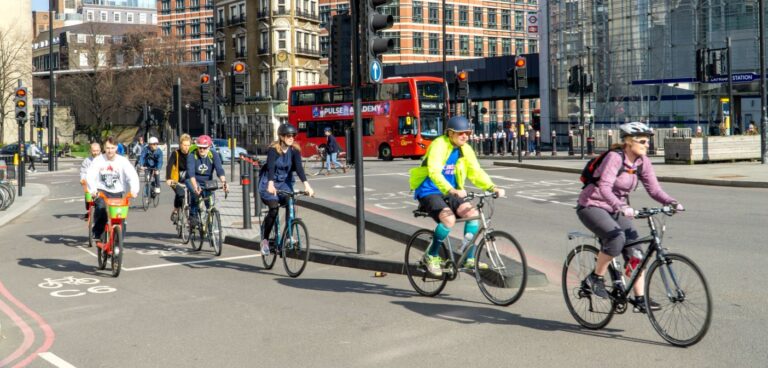A new report commissioned by the UK’s cycling charity has said the 5p cut in fuel duty could have been spent on decarbonising transport in the UK, by using the tax revenue given away to triple investment in active travel to £2.4bn over 12 months.
Cycling UK said at the same time the projected savings made amounts to just £35.78 per capita, a sum unlikely to have a noticeable impact on struggling households over the course of a year.
The report by Walking | Cycling | Climate Action Ltd examined whether equivalent spending in active travel infrastructure would offer better value for money by replacing high-carbon miles driven with low-carbon miles walked and cycled. The report also looked to quantify what the alternative investment would look like in each nation, given that investment in cycling and walking is devolved.
While the fuel duty cut, effective from March 2022 to March 2023, is intended to provide immediate, short-term financial relief to consumers, the report outlines concerns that the benefits may not in fact be passed on to motorists. The authors warned up to 50% of the subsidy may be retained by fuel retailers, thus never reaching the drivers it’s designed to help.
According to the report, tripling investment in active travel would translate into better value for money in three ways:
- The financial relief would be distributed more fairly between families and individuals, regardless of whether they drive, if the money was spent towards creating world-class walking and cycling infrastructure.
- It would also result in a carbon reduction worth 1.5 times the footprint of the entire aviation industry in the UK – a cut of 57.4 megatonnes of CO2-equivalent.
- Redirecting high carbon subsidies to active travel spending would also deliver on big ticket whole-economy issues, including the economy, health, national security and net zero targets.
Duncan Dollimore, head of campaigns and advocacy at Cycling UK, said: “The long- term solution to rising prices at the pumps is to reduce our fuel-dependency by investing in public transport and active travel to give people realistic alternatives to jumping into their car.
“Calls for greater investment in active travel are sometimes rebuffed with claims that there isn’t enough money, but as this report shows, there was money available to revolutionise sustainable transport.
“But instead of investing to reduce car-dependency the chancellor has surrendered £2.4 billion of tax revenue, half of which could go to line the pockets of fuel retailers rather than the public.
“In addition, people on the lowest incomes and most affected by the cost-of-living crisis are also less likely to drive, so won’t benefit at all from this inequitable carbon subsidy. It’s vital that politicians realise that the public want long-term sustainable transport solutions, and the time to act is now.”





